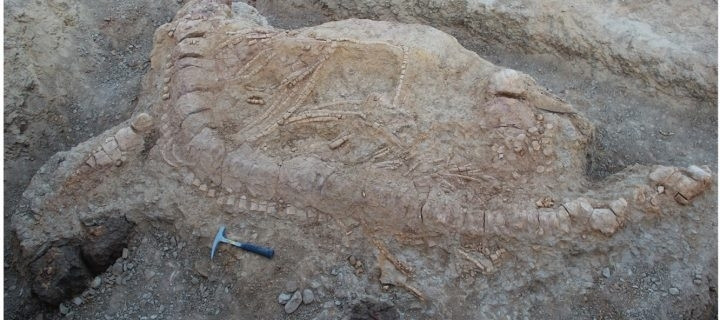150 million-year-old Jurassic-era 'sea dragon' fossil uncovered in India for the first time ever
The sea monster was a "top-tier predator" that likely fed on fish, marine molluscs and other sea reptiles.

An incredibly well-preserved fossil of a 150 million-year-old "sea dragon" that roamed the oceans during the Jurassic era was discovered in India for the first time ever. The 5.5 metre-long sea monster is believed to be one of the most complete skeletons of its kind ever found in the country.
The findings of the discovery were confirmed and published in the open-access journal PLOS only on Wednesday, 25 October, despite the prehistoric creature's fossil being discovered in the village of Lodai, in the state of Gujarat back in 2016.
The Indian Jurassic ichthyosaur is believed to have lived between 152 and 157 million years ago, and is the first Jurassic-era sea creature to have been discovered in the country.
The find may indicate that the ichthyosaur, which is widely known to have resided in European regions, may have migrated between Europe, western India, South America and Madagascar.
The sea monster was a "top-tier predator" that likely fed on fish, marine molluscs and other sea reptiles, according to palaeontologist Guntupalli Prasad, who along with his team, made the discovery.
"This is a remarkable discovery not only because it is the first Jurassic ichthyosaur record from India, but also because it throws light on the evolution and diversity of ichthyosaurs in the Indo-Madagascan region of the former Gondwanaland and India's biological connectivity with other continents in the Jurassic," Prasad said in a statement.
Prasad said that he and his team were unable to locate the skull of the prehistoric sea creature at first, which led them to assume that the jaws and skull may not have been preserved.
However, on digging further, the team found part of the ichthyosaur's jaw vertically embedded in the rocks. "This was an especially useful discovery because the teeth we found offered insights into the ichthyosaur's diet," Prasad explained.
"Vertebrate fossils are rare from the Kachchh region, and we were expecting only bone fragments from this area. So, to find a near-complete skeleton is surprising as well as exciting," Prasad told PLOS Research News.
"This is a fantastic discovery, and is by far the best ichthyosaur skeleton ever found in India," Steve Brusatte, a paleontologist at the University of Edinburgh, who wasn't involved with the study, told National Geographic.
"This find helps to show how globally widespread ichthyosaurs were during the time of dinosaurs," Brusatte added. "They seem to have lived everywhere in the oceans, all over the world, at the same time that dinosaurs were thundering across the land."
Prasad and his team intend to carry out more extensive explorations in the region in the hopes of uncovering more such fossils of ichthyosaurs and other marine reptiles.
"We hope that our find may lead to renewed interest in vertebrate fossil research in this region, which could bring new discoveries to light," Prasad said.






















